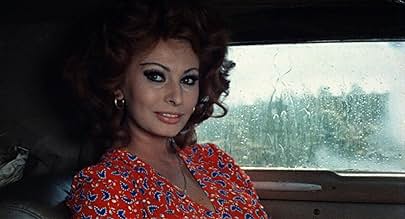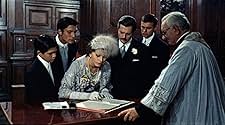AVALIAÇÃO DA IMDb
7,4/10
12 mil
SUA AVALIAÇÃO
Domenico, um milionário, e Filumena, uma prostituta sem dinheiro, compartilham grande parte de suas vidas na Itália após a Segunda Guerra Mundial.Domenico, um milionário, e Filumena, uma prostituta sem dinheiro, compartilham grande parte de suas vidas na Itália após a Segunda Guerra Mundial.Domenico, um milionário, e Filumena, uma prostituta sem dinheiro, compartilham grande parte de suas vidas na Itália após a Segunda Guerra Mundial.
- Direção
- Roteiristas
- Artistas
- Indicado a 2 Oscars
- 7 vitórias e 10 indicações no total
Marilù Tolo
- Diana
- (as Marilu' Tolo)
Alberto Castaldi
- Doctor
- (as Alberto Gastaldi)
Vincenzo Aita
- Alfonso - Priest
- (não creditado)
Avaliações em destaque
When De Sica finally got around to filming Eduardo De Filippo's great play "Filumena" he chose two of Italian cinema's finest actors to play the leads and even if the change of title to "Marriage Italian Style" was something of a sop to commercialism the end result was still hugely satisfying. Sophia Loren, (magnificent), is Filumena, the Neopolitan prostitute, and Marcello Mastroianni, (also superb), the rich patron who strings her along for years, always finding an excuse not to marry her.
It is, of course, a comment on Italian machismo and of the subservient role of women in Italian society so perhaps the comic possibilities of the plot might escape a non-Italian audience, (comedy was never De Sica's strong point). Still, Sophia was never more radiant than she is here, so what's not to love, (she was Oscar-nominated), and De Sica does manage to keep the potential for sentimentality at arm's length. Unfortunately, the film isn't as highly thought of as it once was and isn't much seen today.
It is, of course, a comment on Italian machismo and of the subservient role of women in Italian society so perhaps the comic possibilities of the plot might escape a non-Italian audience, (comedy was never De Sica's strong point). Still, Sophia was never more radiant than she is here, so what's not to love, (she was Oscar-nominated), and De Sica does manage to keep the potential for sentimentality at arm's length. Unfortunately, the film isn't as highly thought of as it once was and isn't much seen today.
A fine showcase for Sophia Loren who at the age of thirty portrays and older women seemingly at death's door as well as a young girl of seventeen. And throughout she has a fantastic rapport with Marcello Mastroianni and however fantastical becomes the action, however unrealistic the Italian 'realism' we believe in her. She is not, if there is such a thing, a 'classic' beauty and yet she always looks lovely. Her face can express sadness, concern, happiness and glee, all within seconds of each other and with her all the time remaining attractive. Her body is probably even more remarkable but it is the way she can move that is truly magical, and sexy. She can striptese all day long but the magic is when she begins to walk or skip along the street. Remarkable. And on the screen, of course, quite magical. So if the first half of this Vittorio De Sica film can be sluggish with comedic moments that don't quite cut it today (if they ever did outside of Italy) there is always Loren to look at and the pairing of the two to enjoy. Things get going and if we find it hard to glorify prostitution one moment and femininity and motherhood the next, it is not a problem for the Italians and eventually we too are swept along in a romanticised wave of well being.
MARRIAGE Italian STYLE is a glossy rendition of Eduardo De Filippo's Neapolitan play "Filumena Marturano", which he himself had made into a film in 1951. In this 1964 version Sophia Loren and Marcello Mastroianni take the roles previously played by Eduardo and Titina De Filippo. The story deals with the long love affair between a wealthy, arrogant and selfish Neapolitan businessman (Marcello Mastroianni) and the seemingly ignorant ex-prostitute (Loren) who attempts to trick him into marriage by pretending to be dying and then bouncing back to life. She does all this because she wants to guarantee a better life for her three semi-secret children. One of her children is his, she tells him. Which one, she will never say.
To say that Mastroianni and Loren had on-screen chemistry is an enormous understatement. They are both as marvelous together here as is other films together, most notably YESTERDAY, TODAY, AND TOMORROW and A SPECIAL DAY. For me one of the best moments in the film is Loren's walk down a sidewalk in Naples where the men and boys alike gape at her. That always knocks me out. Loren walks marvelously there and does a magnificent acting job elsewhere in this engaging dramatic farce. The film was directed by Vittorio De Sica, who had directed Loren's Academy Award performance in TWO WOMEN (LA CIOCIARA). It is among her most notable roles ever, along with TWO WOMEN, A SPECIAL DAY, THE BLACK ORCHID, and Lina Wertmüller's Saturday, Sunday, AND Monday.
To say that Mastroianni and Loren had on-screen chemistry is an enormous understatement. They are both as marvelous together here as is other films together, most notably YESTERDAY, TODAY, AND TOMORROW and A SPECIAL DAY. For me one of the best moments in the film is Loren's walk down a sidewalk in Naples where the men and boys alike gape at her. That always knocks me out. Loren walks marvelously there and does a magnificent acting job elsewhere in this engaging dramatic farce. The film was directed by Vittorio De Sica, who had directed Loren's Academy Award performance in TWO WOMEN (LA CIOCIARA). It is among her most notable roles ever, along with TWO WOMEN, A SPECIAL DAY, THE BLACK ORCHID, and Lina Wertmüller's Saturday, Sunday, AND Monday.
The film employs a tremendously perky rhythm and register to showcase the traits of the earthly Italy at its post-war development, even though essentially the overwrought kernel of a prostitute's tribulations could hardly appropriate as a comedy material.
Vittorio De Sica's camera enigmatically haunts and pivots around two leads' present and past, the intangible love/hate chaos is disarmingly intriguing and subconsciously imbues the audience with a fervent compassion towards Sophia Loren's unswerving while passionate Filumena. The leading performance is worth of much accolade, especially for Sophia Loren, whose full-brown force of personality spanning over 20 years in the film and indisputably devotes a magnificent performance with all her zest and vigor. Marcello Mastroianni, is great as well, to hone up his versatility and render the womanizer an ambiguous moral criterion which is a more delicate task.
I cannot help being fascinated by the exquisite script as well, credited by five names, no wonder all the twists and turns are so fruitful in a way that both surprising and amusing. Nominated for 2 Oscars (BEST FOREIGN FILM and a second BEST ACTRESS nomination for Loren) and is a milestone which not only represents Loren's heyday but also is a comforting fruition of Loren-Conti correlation. Maybe it is not director De Sica's best canon due to its slight superficiality of machismo, which I sense may not be the director's fault as it is a general bias lies in all over the globe. Anyway, the film itself surely is a fine piece captures a genuine Italian aura (the Naples' style) and definitely worth your pocket.
Vittorio De Sica's camera enigmatically haunts and pivots around two leads' present and past, the intangible love/hate chaos is disarmingly intriguing and subconsciously imbues the audience with a fervent compassion towards Sophia Loren's unswerving while passionate Filumena. The leading performance is worth of much accolade, especially for Sophia Loren, whose full-brown force of personality spanning over 20 years in the film and indisputably devotes a magnificent performance with all her zest and vigor. Marcello Mastroianni, is great as well, to hone up his versatility and render the womanizer an ambiguous moral criterion which is a more delicate task.
I cannot help being fascinated by the exquisite script as well, credited by five names, no wonder all the twists and turns are so fruitful in a way that both surprising and amusing. Nominated for 2 Oscars (BEST FOREIGN FILM and a second BEST ACTRESS nomination for Loren) and is a milestone which not only represents Loren's heyday but also is a comforting fruition of Loren-Conti correlation. Maybe it is not director De Sica's best canon due to its slight superficiality of machismo, which I sense may not be the director's fault as it is a general bias lies in all over the globe. Anyway, the film itself surely is a fine piece captures a genuine Italian aura (the Naples' style) and definitely worth your pocket.
Sophia Loren was the greatest actress of her generation when directed by Vittorio De Sica. Watching "Marriage Italian Style" in 2009 confirms that notion, totally. She is mesmerizing in this tragicomic creation by the great Neapolitan author Edoardo De Filippo. We manage to travel away from her external beauty, not an easy thing to do, and dive into her interior beauty and Oh God, how extraordinary! She is beyond truthful, she transforms the most basic element in a woman's heart into pure undiluted art. I was surprised to realize what a villain Domenico Soriano (Marcello Mastroianni) was. And he is the romantic counterpart! Here is where the Italians excel. What a terrifying act of self examination. The Italian male, as written by De Filippo, directed by De Sica and interpreted by the amazing Mastroianni is an everyday, almost acceptable monster in a society that breathes this kind of monster. Strange watching this now, Italy then, as far as women were concerned, were not that far away from a Muslim country. Women's role was basically subservient and a character like Mastroianni's could forge ahead un-accused and unrepentant. Besides the magic of the storytelling and the incredible performance by La Loren, this is is an excruciating document of its day.
Você sabia?
- CuriosidadesDomenico arranges an apartment in Naples for Filumena. The former tenant's belongings are still in. There is a picture of Clara Petacci (dictator Mussolini's mistress) on the wall and Filumena asks when this will be removed. The scene is set in the late 1940s, so this obviously symbolizes Italy's transition from fascism to a republic. Mussolini himself would probably not have passed the censors.
- Citações
Filumena Marturano: [subtitled version] The problem is that our hearts used to be so big...
[holds up pebble]
Filumena Marturano: and now look how small they are.
- ConexõesEdited into Marcello, uma Vida Doce (2006)
- Trilhas sonorasMunasterio 'e Santa Chiara
(uncredited)
Written by Michele Galdieri and Alberto Barberis
Sung by Don Domenico on the trip home from the racecourse; Don Domencio also asks the boys to sing it
Principais escolhas
Faça login para avaliar e ver a lista de recomendações personalizadas
- How long is Marriage Italian Style?Fornecido pela Alexa
Detalhes
Bilheteria
- Faturamento bruto nos EUA e Canadá
- US$ 10.600
- Fim de semana de estreia nos EUA e Canadá
- US$ 4.967
- 25 de set. de 2011
- Faturamento bruto mundial
- US$ 210.834
- Tempo de duração
- 1 h 42 min(102 min)
- Mixagem de som
- Proporção
- 1.85 : 1
Contribua para esta página
Sugerir uma alteração ou adicionar conteúdo ausente





























